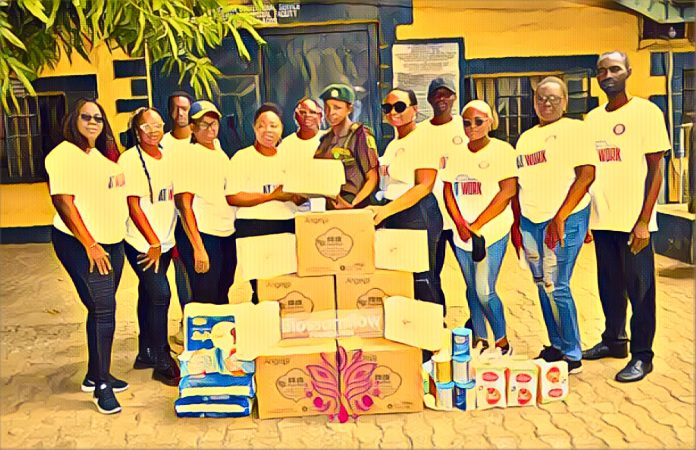Summary:
- Blossom Flow Foundation, an NGO, led a mission to raise awareness about menstrual hygiene among female inmates at the Kirikiri Female Custodial Center in Lagos State.
- The initiative, which took place on April 12th, 2024, aimed to provide essential sanitary products and support to over 300 female inmates.
- The event served as a platform to advocate against period poverty, highlighting the challenges faced by incarcerated women in accessing sanitary pads.
In order to combat period poverty, the Blossom Flow Foundation, a non-governmental organization, embarked on a mission to raise awareness about menstrual hygiene among female inmates at the Kirikiri Female Custodial Center in Lagos State. The initiative, led by Mrs. Joan Faluyi, was undertaken on April 12th, 2024, with the primary objective of providing essential sanitary products and support to over 300 female inmates, including girls, women, nursing mothers, and pregnant women.
The event served as a platform to advocate against period poverty, shedding light on the challenges faced by women in accessing sanitary pads. This struggle is exacerbated for female inmates who lack the means to procure them. Mrs. Faluyi emphasized that while period poverty is a significant issue for women living with their families, it presents an even more daunting challenge for incarcerated women who are unable to work.
The dire circumstances often force these women to resort to unhygienic alternatives such as newspapers, nylons, or rags, leading to infections and discomfort. Recognizing the urgency of the situation, Blossom Flow Foundation, with the support of partners like Multimodal Transport Technologies Ltd and Offshore Dimensions, as well as individuals like Mrs. Ofi Valentina Amiebi-Uchegbu, provided not only sanitary products but also essential items such as baby diapers, milk, and napkins.
The impact of the initiative extended beyond physical relief, fostering emotional support evident in the heartfelt interactions between volunteers and inmates. Former struggles with makeshift sanitary solutions were recounted by some inmates, contrasting sharply with the sense of dignity and relief brought about by the foundation’s intervention.
Expressing gratitude for the organization’s efforts, the inmates shared stories of degradation and discomfort associated with their previous methods of managing menstruation. The provision of sanitary solutions marked a significant improvement in their quality of life, resonating with themes of hope and resilience that permeated the facility as inmates sang and danced in appreciation.
Mrs. Faluyi reiterated the foundation’s commitment to advocating for menstrual health and dignity for all women, emphasizing the importance of addressing period poverty in even the most challenging environments. The emotional exchanges between Mrs. Faluyi and the inmates underscored the personal connections forged during the visit, leaving a lasting impression of solidarity and support.
Deputy Controller of the Female Custodial Center, DCP Esther Taiwo, commended the foundation for its efforts, acknowledging the positive impact on community building and living conditions within the center. She urged continued support and partnership, recognizing the potential for further empowerment of women and girls across various segments of society through initiatives like those undertaken by Blossom Flow Foundation.
The sensitization program and donation drive organized by Blossom Flow Foundation exemplify the power of collective action in addressing pressing social issues such as menstrual hygiene and period poverty. By providing both practical assistance and emotional support, the foundation has made significant strides towards empowering incarcerated women and fostering a sense of dignity and hope within the Kirikiri Female Custodial Center.



